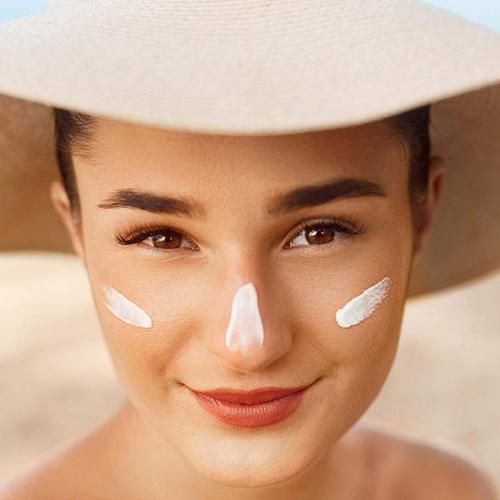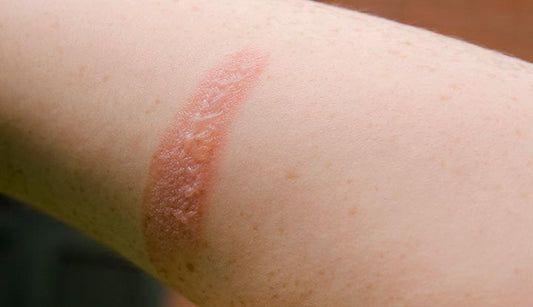Can Collagen Help Sun Damaged Skin?
What is the biggest danger to your skin? No, it's not getting old, it's the sunlight. Ultraviolet radiation from chronic sun exposure can damage your skin in more ways than one. While we can take precautions to help protect our skin from sunlight, thanks to sunscreens, what else can we do to help improve skin health? Are there ways we can help improve sun damaged skin?
The answer is yes, but first we need to understand what happens to our skin when it comes into contact with sunlight.
Sunlight changes the health of the skin
One of the biggest dangers to our bodies is something called oxidative stress. Oxidative stress is an imbalance between antioxidants and highly chemically reactive molecules (free radicals) that causes damage to cellular DNA. When there are more free radicals in the body than there are antioxidants, this is a state of oxidative stress. Oxidative stress can increase your risk for a variety of health problems including diabetes, high blood pressure, heart conditions, inflammatory diseases, and even Alzheimer's. However, it can also pose a danger to our skin.
Ultraviolet rays from sunlight change the structural integrity of our skin. When UVA and UVB rays come into contact with the skin, they can increase the amount of free radicals that damage the DNA of skin cells. This can cause hyperactive cell proliferation, or cell division, which can increase the risk of skin cancer and premature aging.
Changes in the DNA of skin cells can cause additional problems. It can damage cell functions, particularly the immune cells that live in the dermis. Ultraviolet radiation can increase the inflammatory response, which can alter how quickly the skin repairs itself and heals. It can also change the elasticity of our skin and destroy essential proteins called collagen.
What is collagen?
Collagen is one of the most abundant proteins in the body. It forms the connective tissues in almost all systems. Collagen can be found in bones, joints, cartilage, the lining of internal organs, and most importantly, in the skin. Collagen makes up about 80 percent of the skin and is where most of the immune cells reside.
Collagen production naturally begins to decline as we age, but exposure to ultraviolet radiation can cause collagen to break down faster. This can make it difficult for the body to replace those collagens with new ones.
How to identify sun damaged skin
Managing sun damage prevention and protection begins with understanding what sun-damaged skin looks like. There are many indications of sun-damaged skin in addition to typical sunburn, though that should be taken just as seriously, as a large volume of sunburn can exponentially increase the risk of skin cancer. What are others, though? signs of sun damaged skin?Signs of sun damage include:
- Moles (cancerous and non-cancerous)
- Wrinkles and fine lines
- Dry Skin
Moles
Moles can also be a sign of sun damage, depending on their appearance. Not all moles are cancerous, in fact many are not, but special attention should be paid to them as a precaution. To better understand the difference between cancerous and non-cancerous moles, we first need to know how moles form.
Inside the skin are cells called melanocytes. These cells form the skin's natural pigments called melanin. When melanocytes grow in clusters or groups, they create moles. Sometimes the rate at which melanocytes clump together is slight, other times they grow and clump together at a rapid rate. When these melanocytes create large, discolored moles, this is usually a sign that the mole is cancerous.
What do cancerous moles look like? Cancerous moles can vary in appearance, but they usually have some commonalities. Cancerous moles can have any of the following observable qualities:
- Different shades of brown or black.
- They may look red, blue, or even white as they grow.
- be oversized
- Being elevated above the skin.
You should schedule regular checkups with your doctor to screen for skin cancers, especially if they are common in your family medical history.
Wrinkles and fine lines
While wrinkles and fine lines are a sign of natural aging, they can be made worse by chronic UV exposure. The elasticity of the skin depends on the structural integrity of the proteins and the amount of moisture retained by those proteins. Sunlight can weaken these proteins, which in turn dries them out and makes the skin less hydrated. This makes the skin heavier, which can cause deep folds in the skin in the form of fine lines and wrinkles.
Dry Skin
For women who regularly experience dry skin, this can also be an indication of sun damage. Dry skin can be a sign that the skin is losing its elasticity at a faster rate than it would naturally during the aging process. We know that ultraviolet radiation from sunlight can break down collagens, which is where most of the skin's moisture is stored. However, it can also dry out the natural oils that are produced in the skin.
Sebaceous glands are glands in the skin that release natural oils (mainly sebum). These natural oils help keep skin hydrated and help maintain the health of the skin microbiome. The skin microbiome is the collection of bacteria that live on the skin. These bacteria can help maintain the microbial health of the skin and work with immune cells to reduce the risk of spreading other bacteria and viruses.
What can you do?
So if sun damage poses a threat to our skin, what can we do to help combat it? Staying hydrated, using sunscreen, staying in the shade, and hydrating are all great ways to help reduce sun damage to some degree. However, is there anything else women can do to help maintain the health of their skin?
Yes there are. One of the things that women can do to help maintain the health of their skin is to stimulate the absorption and production of collagen. Maintaining steady levels of collagen can help the body maintain immune cell levels and maintain moisture. So how can women best maintain collagen production as they age?
Take a collagen supplement
When the body cannot produce new collagen as efficiently, the next best step is to use a collagen supplement. A good collagen supplement is made with collagens that are easily absorbed by the body. An excellent example of this is collagen capsules. Colvite.
Colvite is a collagen supplement designed with specific collagens to help maintain collagen levels in the skin. With the help of Colvite, can help maintain your skin's health by promoting healthy collagen levels, supporting the skin's immune response, and keeping skin hydrated.
It is possible to combat sun damage
Sun damage doesn't have to put your skin at permanent risk. With the right tools and consistent skincare habits






















































































































